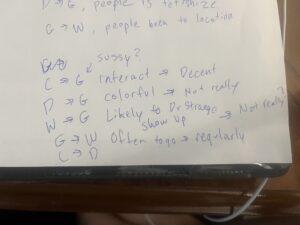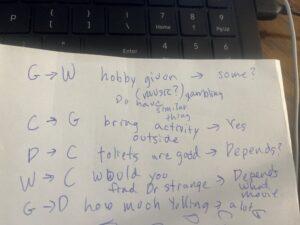Playing Spyfall
For this week’s critical play, I decided to play Spyfall with 3 of my friends over a Discord call. Spyfall is a social deduction game designed by Alexandr Ushan and originally published by Hobby World for players age 13+. Although Spyfall is typically a card game, I used an online version hosted on netgames.io (created by Luke Tsekouras) to play a digital version with my group.
Spyfall emphasizes social deduction by introducing conflict by restricting player’s access to information, using a question and answer dynamic between players, and allowing the spy to guess the location even after being voted out.
Playing a round of Spyfall
Information as a Resource
The information war between players starts with a question. Questions have to be specific enough for other non-spy players (town) to confirm each other’s identity and vague enough to keep the spy guessing where the location was. Since no one knows what role the other players have, the first round of questions were often spread out so that everyone answered at least one question. My group also paid attention to how a question was asked, with one player specifically mentioning that they used “feeling good” instead of “happy ending” to describe how one might feel after a trip to the day spa to try and mislead the spy. Furthermore, another player even made a written log of questions and responses to better keep track of the current known information . Since information was scarce and Spyfall doesn’t really have a way for players to record information, questions were used to shed light onto the true identities of the players.
Written Logs of Questions and Answers
More Than Just Questions and Answers
By using a question-answer format rule, players were also allowed to engage in various dynamics in addition to just the question-answer rule to do social deduction. In our group, we made use of inside jokes which may only be known to a subset of the players. An example of this was when a player asked about an anime about a doctor in relation to the hospital location while knowing that the other two players would be unaware of such an anime. Another dynamic was the use of “good question” and “good answer” regardless if the question or answer was actually good or not. This dynamic of saying “good question” and “good answer” allowed the town to further confuse the spy by blurring good and bad information together. A spy lamented that there was no good information since they were constantly unsure due to the “good questions” and “good answers”. The concept of boundaries applies heavily here. Dynamics such as the inclusion of inside jokes and other discussion elements expand the “magic circle” by including not only the rules of Spyfall, but also the interpersonal dynamics between the players.
It’s Not Over Until It’s Over
The spy’s opportunity to guess the location even after being correctly identified is also a mechanic that promotes social deduction. In the online version of Spyfall that we played, spies were allowed to guess at the end of every round. Since the spy always had a second chance, it was important to pay attention to all information available to make your best guess. While the bulk of a spy’s information came from the question-answer segment, the discussion portion during voting also provided the spy access to another information source. While we were playing, there was a fail where one town player accidently said the location during the discussion portion (the spy ignored it in good faith). Since the main objective of Spyfall is to outwit the other party (town vs. spy), the mechanic of allowing a guess even after identifying the spy encourages spies to continue their social deduction efforts up until the very end of the game.
Closing Thoughts
The main difference between Spyfall and other social deduction games would be its lack of rules. With the only strict rules being the location and roles of the players, the question-answer format of the game, the voting process, and the spy guess, Spyfall is vastly different from other social deduction games where there is a strict process and sequence to follow (Avalon / The Resistance, Among Us, One Night Ultimate Werewolf). This difference allows players to craft a free-flowing game structure where each player can deduce the true identities of the people they are playing with.
Spyfall is a game which promotes fun as fellowship as players learn more about the tendencies and habits of their fellow players. It was fun to see how my friends dealt with being ganged up on when they were identified as the spy or how they tried to defend themselves when they were being mistakenly accused of being a spy.
Side note: it was strange that of the four players, only two of them were ever chosen as the spy in the ~8+ rounds we played together.








